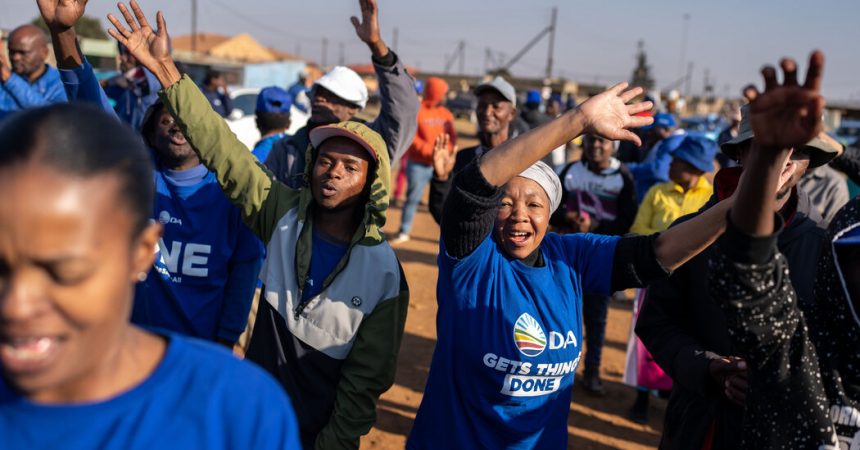Papi Mazibuko, a 50-year-old library assistant, decided it was time to switch teams and vote for the Democratic Alliance, the leading opposition party in the national elections in South Africa on Wednesday.
Houses on his street in the township of Evaton, south of Johannesburg, had been without power for two and a half years because of a broken transformer. The government, led by the African National Congress, or A.N.C., failed to fix it.
The neighboring municipality, run by the Democratic Alliance, had a good record of delivering basic utilities. So Mr. Mazibuko rallied neighbors to a campaign event last year that featured John Steenhuisen, the party’s leader, who has been met with skepticism by some Black voters because he is white.
“We want service delivery,” said Mr. Mazibuko, who had been an A.N.C. member since his teens. He added that even if “a white man can deliver, then so be it.”
Opposition parties see this year as their best chance to break the political dominance of the A.N.C., which has comfortably won all six national elections since the first democratic vote 30 years ago. South Africa’s opposition has long failed to inspire voters, political analysts say.
This year, though, many polls predict that the A.N.C. will fall below 50 percent of the national vote. A record 51 opposition parties on the national ballot are trying to sell South Africans on the idea that the country would be better off without the A.N.C. in charge.
The options are diverse: from the center-right Democratic Alliance, which wants to scrap economic policies that give preferences to nonwhite South Africans, to the left-wing Economic Freedom Fighters, the third-largest party, which advocates an aggressive redistribution of wealth to the nation’s Black majority.
Many new, small parties have entered the arena, some catering to particular ethnic and social groups, others emphasizing specific issues like closing the borders or implementing the death penalty.
The biggest wild card is the uMkhonto weSizwe Party launched last December and led by Jacob Zuma, former president of the A.N.C. and the country. Mr. Zuma was recently barred from serving in Parliament because of a criminal conviction. But he still leads his party and could draw disaffected A.N.C. voters who might otherwise have stayed home, said Wayne Sussman, a South African election analyst.
The question remains whether these parties will move South Africans in enough numbers to break the A.N.C.’s stranglehold. Some in the opposition argue that their experience running cities shows they can govern the country better than the A.N.C.
Yet, even though the A.N.C. has lost popularity because of corruption and poor leadership, South Africans say that their alternatives are no better.
A little more than a quarter of South Africans trust the A.N.C., but trust in opposition parties was even lower at 24 percent, according to a 2021 poll by the independent research organization Afrobarometer.
The Democratic Alliance, which won nearly 21 percent of the votes in the last election, and the Economic Freedom Fighters, which was at nearly 11 percent, have been polling only slightly higher than those numbers before Wednesday’s contest. Mr. Zuma’s party has drawn over 10 percent in some polls. Still, they all trail the A.N.C., which is polling in the low 40s, down from the 58 percent it won in 2019.
A bloc of 11 parties says it will form a government if it combines to win more than 50 percent of the vote, but that seems like a long shot: Only four of the parties won parliamentary seats in the last election, totaling 27 percent of the vote.
Opposition parties, which have historically run on anti-A.N.C. messages, often focus on gaining power rather than addressing the nation’s challenges, said Mmabatho Mongae, a data analyst at Good Governance Africa, a nonpartisan advocacy organization.
“They’re not able to really capture the political imagination and political psyche of South Africans,” she said.
They also face a hurdle in gaining trust.
A Democratic Alliance leader canvassing for votes in Evaton in March approached Aletta Mokoena, who was standing outside of her tin shack clutching a mop. Ms. Mokoena, 46, was immediately suspicious.
She said she had heard “that your party is for the white people and, you know, that the white people will take us back to the apartheid era.”
The canvasser, Kingsol Chabalala, who is Black, insisted that those critics “are telling you lies.” But Ms. Mokoena was unmoved.
“After we vote for you, you won’t be able to fulfill,” she said.
Worse than these rejections, Mr. Chabalala said, is when residents tell him they’ve switched to the Democratic Alliance but end up voting for the A.N.C. The party’s control of government resources can be too much to overcome.
Papi Mazibuko got his electricity back in Evaton about a month after the Democratic Alliance rally. His many calls to the A.N.C. ward councilor about the broken transformer had paid off.
“The same A.N.C. that we were fighting is the one that brought us electricity,” he said. And so he’s had a change of heart: On Wednesday, he’ll stick with the A.N.C. after all.






